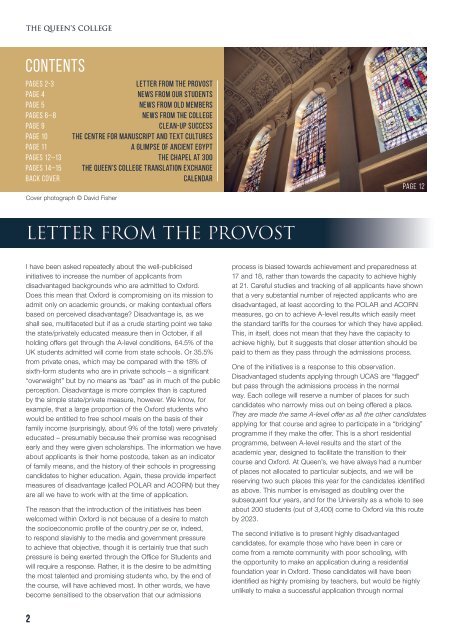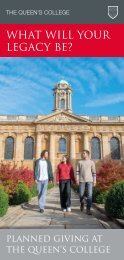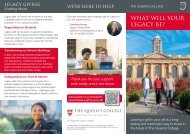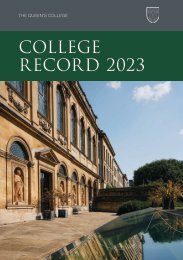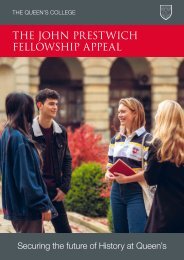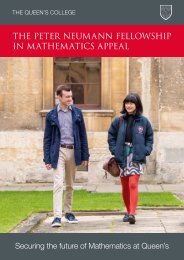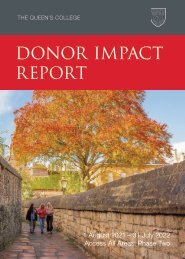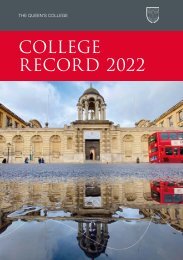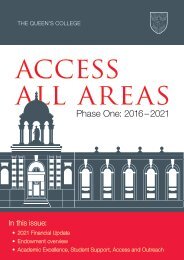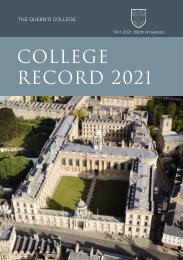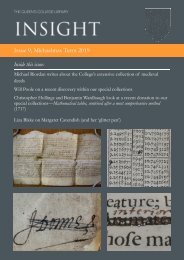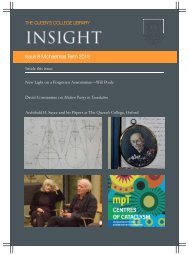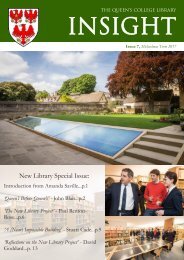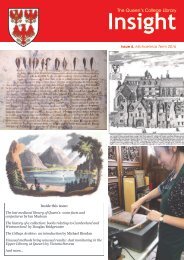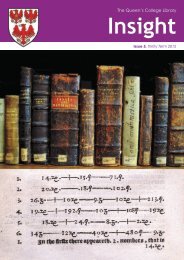The Queen's College Newsletter: Trinity Term 2019
As well as the usual College news, this edition focuses on the different work being undertaken at the College to explore the importance of languages: from bringing creative translation to classrooms in Oxfordshire, to examining ancient texts and gleaning new knowledge about past cultures. This Newsletter also includes the final letter from Provost Professor Paul Madden before his retirement.
As well as the usual College news, this edition focuses on the different work being undertaken at the College to explore the importance of languages: from bringing creative translation to classrooms in Oxfordshire, to examining ancient texts and gleaning new knowledge about past cultures. This Newsletter also includes the final letter from Provost Professor Paul Madden before his retirement.
- No tags were found...
You also want an ePaper? Increase the reach of your titles
YUMPU automatically turns print PDFs into web optimized ePapers that Google loves.
THE QUEEN’S COLLEGE<br />
www.queens.ox.ac.uk<br />
Contents<br />
pages 2-3<br />
Letter from the provost<br />
Page 4<br />
News from our students<br />
Page 5<br />
News from old members<br />
Pages 6–8<br />
News from the <strong>College</strong><br />
page 9<br />
Clean-up success<br />
page 10 <strong>The</strong> centre for manuscript and text cultures<br />
Page 11<br />
A glimpse of ancient egypt<br />
pages 12–13 <strong>The</strong> chapel at 300<br />
pages 14–15 <strong>The</strong> Queen’s <strong>College</strong> Translation Exchange<br />
back cover<br />
calendar<br />
Cover photograph © David Fisher<br />
letter from the Provost<br />
I have been asked repeatedly about the well-publicised<br />
initiatives to increase the number of applicants from<br />
disadvantaged backgrounds who are admitted to Oxford.<br />
Does this mean that Oxford is compromising on its mission to<br />
admit only on academic grounds, or making contextual offers<br />
based on perceived disadvantage? Disadvantage is, as we<br />
shall see, multifaceted but if as a crude starting point we take<br />
the state/privately educated measure then in October, if all<br />
holding offers get through the A-level conditions, 64.5% of the<br />
UK students admitted will come from state schools. Or 35.5%<br />
from private ones, which may be compared with the 18% of<br />
sixth-form students who are in private schools – a significant<br />
“overweight” but by no means as “bad” as in much of the public<br />
perception. Disadvantage is more complex than is captured<br />
by the simple state/private measure, however. We know, for<br />
example, that a large proportion of the Oxford students who<br />
would be entitled to free school meals on the basis of their<br />
family income (surprisingly, about 9% of the total) were privately<br />
educated – presumably because their promise was recognised<br />
early and they were given scholarships. <strong>The</strong> information we have<br />
about applicants is their home postcode, taken as an indicator<br />
of family means, and the history of their schools in progressing<br />
candidates to higher education. Again, these provide imperfect<br />
measures of disadvantage (called POLAR and ACORN) but they<br />
are all we have to work with at the time of application.<br />
<strong>The</strong> reason that the introduction of the initiatives has been<br />
welcomed within Oxford is not because of a desire to match<br />
the socioeconomic profile of the country per se or, indeed,<br />
to respond slavishly to the media and government pressure<br />
to achieve that objective, though it is certainly true that such<br />
pressure is being exerted through the Office for Students and<br />
will require a response. Rather, it is the desire to be admitting<br />
the most talented and promising students who, by the end of<br />
the course, will have achieved most. In other words, we have<br />
become sensitised to the observation that our admissions<br />
PAGE 12<br />
process is biased towards achievement and preparedness at<br />
17 and 18, rather than towards the capacity to achieve highly<br />
at 21. Careful studies and tracking of all applicants have shown<br />
that a very substantial number of rejected applicants who are<br />
disadvantaged, at least according to the POLAR and ACORN<br />
measures, go on to achieve A-level results which easily meet<br />
the standard tariffs for the courses for which they have applied.<br />
This, in itself, does not mean that they have the capacity to<br />
achieve highly, but it suggests that closer attention should be<br />
paid to them as they pass through the admissions process.<br />
One of the initiatives is a response to this observation.<br />
Disadvantaged students applying through UCAS are “flagged”<br />
but pass through the admissions process in the normal<br />
way. Each college will reserve a number of places for such<br />
candidates who narrowly miss out on being offered a place.<br />
<strong>The</strong>y are made the same A-level offer as all the other candidates<br />
applying for that course and agree to participate in a “bridging”<br />
programme if they make the offer. This is a short residential<br />
programme, between A-level results and the start of the<br />
academic year, designed to facilitate the transition to their<br />
course and Oxford. At Queen’s, we have always had a number<br />
of places not allocated to particular subjects, and we will be<br />
reserving two such places this year for the candidates identified<br />
as above. This number is envisaged as doubling over the<br />
subsequent four years, and for the University as a whole to see<br />
about 200 students (out of 3,400) come to Oxford via this route<br />
by 2023.<br />
<strong>The</strong> second initiative is to present highly disadvantaged<br />
candidates, for example those who have been in care or<br />
come from a remote community with poor schooling, with<br />
the opportunity to make an application during a residential<br />
foundation year in Oxford. <strong>The</strong>se candidates will have been<br />
identified as highly promising by teachers, but would be highly<br />
unlikely to make a successful application through normal<br />
channels because of their educational disadvantage. Because<br />
the initial application will not be made through UCAS, it will<br />
be possible to ask for some hard information about their<br />
circumstances. It is envisaged that about 30 students<br />
each year will come through this route by 2023. Queen’s<br />
will not be participating in this programme initially,<br />
as we do not have the space or the resources to<br />
deal with the foundation year. However, we will be<br />
providing a substantial part of the funding for it,<br />
and for the bridging scheme, through a system<br />
of University taxation to which we make a large<br />
contribution.<br />
As I dare say you are aware, this will be my last<br />
<strong>Newsletter</strong> before heading off into retirement.<br />
I feel that I am leaving the <strong>College</strong> in good<br />
shape, with the commitment to the tutorial<br />
system and the presentation of opportunities<br />
for further development to all students firmly<br />
in place. <strong>The</strong> traditional strong sense of a<br />
community extends throughout the <strong>College</strong> and<br />
has come to embrace a large pool of Old Members,<br />
who have been very generous and engaged. A lot<br />
of high-quality building work has been done, but<br />
I will also be bequeathing a number of projects to<br />
my successor who, I am sure, will receive the same<br />
level of support. I have enjoyed my eleven years “in<br />
charge” enormously and they have been the highlight<br />
of my career. I am very grateful to the large number of<br />
people who have helped me – Fellows, Staff, students,<br />
but particularly to Alison who has always been there.<br />
2<br />
3


